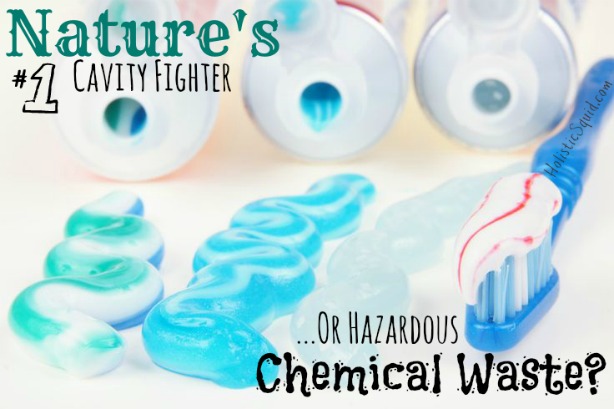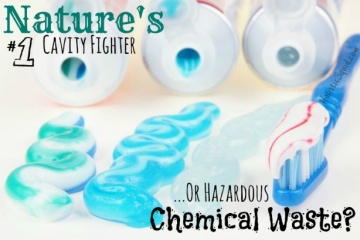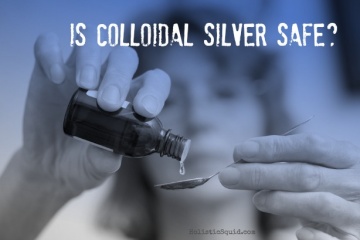
Fluoride has equaled healthy teeth in American minds since it became an official policy of the U.S. Public Health Service in 1951 as a large scale cavity prevention measure. Today about 60% of US population gets fluoridated water on tap.
If you shop in health food stores, you may see some toothpastes and mouthwashes labeled ‘fluoride-free‘. So, if fluoride's so important for cavity prevention and dental health, why would anyone opt to skip it?
There is extensive evidence that fluoride could actually be harmful to our teeth and our overall health, especially when added to our water supply.
What is fluoride anyway?
Fluoride is a compound that occurs when fluorine ion bonds with another agent. Calcium fluoride is the most-common naturally-occurring form of fluoride, and in small amounts it is not toxic as it is not readily absorbed by the body.
Calcium fluoride is NOT the fluoride used in water fluoridation and most dental products. All other form of fluoride, including silicofluorides, sodium fluoride, sodium monofluorophosphate, and others are readily absorbed by the body.
Fluoride is not a nutrient; it acts as a poison when ingested and absorbed. It is not something our bodies need. There is no such thing as a fluoride deficiency. Although fluoride may play a role in promoting dental health and preventing caries, it's doubtful anyone's water really “needs” fluoridation.
Potential risks of overexposure to fluoride
There are studies that link excess fluoride consumption to the following:
- Bone disease including fluorosis (where the teeth become weak, mottled, and discolored), hip fractures, ligament calcification, osteoporosis
- Cancer, especially bone and bladder
- Gum disease
- Thyroid dysfunction and iodine deficiency
- Kidney and liver disease
- Genetic defects
- Endocrine imbalance
- Nervous system disorders, including Alzheimer's disease
Does fluoride work for cavity prevention?
Fluoride fights dental decay by binding to your teeth, hardening them, and protecting them from acids. The same reason the fluoride is good for your teeth and cavity prevention is also why it can be so harmful if ingested. When swallowed, it will build up on your bones, which is detrimental for bone health.
The compound used in most conventional and “natural” toothpastes and mouthwashes, sodium fluoride, is toxic when ingested. For this reason, toothpaste and mouthwash containing fluoride should never be swallowed.
So much conflicting information on the supposed dental health benefits of fluoride is available today, it's almost impossible to tell what's true and what's false. Studies do show that tooth decay has declined in the US as a whole since fluoridation began, but it is also on the decline in non-fluoridated areas of the US and in Europe where fluoridation isn't common.
From a holistic perspective, while it is certainly important to remove excess food from the teeth after eating, dental health is not just about what we use to clean our teeth. Healthy teeth depend on the overall health of our bodies determined by dietary intake, toxic exposure, and genetic make-up.
Why is fluoride in our water?
Silicofluorides are what's used most of the time for fluoridation of water supplies. These come from fluorosilicic acid, which is a by-product of phosphate production of the aluminum, steel, ceramic, phosphate fertilizer, and other chemical industries.
Silicofluorides often contain lead, uranium, arsenic and other pollutants. As you may guess, they are super toxic. They are also non-biodegradable and if not used in fluoridation, they would need to be treated at a hazardous waste facility before being disposed of in the environment.
Certainly, fluoridation provides a cost benefit for many corporations, which is part of the reason fluoridation of public water supplies doesn't sit well with many concerned citizens.
Regulations are in place to safeguard against “over” fluoridating water, yet some communities have pushed to completely stop adding this chemical to their water. Whether or not fluoridation is dangerous, adding what the FDA considers a “prescription drug” to drinking water does seem to violate fundamental rights to make individual choices about medical treatments.
Fluoride is so widely used in toothpastes, mouth washes, and other dental products, that almost anyone who practices even moderate dental health care is likely receiving plenty of fluoride without needing to also drink it in water. This is true for everyone, even residents of low income areas that were once thought to be helped dramatically by fluoridation.
Make up your own mind about fluoride
In your water
If you're concerned about fluoridation in your community (like I am), a reverse osmosis water filter is one of the best ways to eliminate it from your drinking water. Keep in mind that RO filters will strip your water of all minerals as well, so you will need to add some minerals (via supplementation) back to the water for optimal absorption.
This is the water filter we use, and you can also get this countertop filter that takes care of fluoride too.
On your toothbrush – DON'T SWALLOW!
You can opt for natural tooth care products that don't contain fluoride if you wish to cut down on fluoride exposure.
Xylitol is a natural and safe alcohol sugar that excels at fighting bacteria. Xylitol can be found in some natural toothpastes and mouthwashes, and is a great alternative to fluoride.
For your children
Even if you decide that you're not concerned about fluoride for your own health, consider that young babies and children under 6 should not drink tap water (this is especially a concern for those who are formula fed).
Babies and children who cannot spit out toothpaste should use fluoride-free products until they are old enough not to swallow. Dental products with xylitol are a great choice for kids or – even better – make your own with an easy home recipe.
Are you concerned about fluoride exposure? Why or why not?









Hi there,
I am researching a system for water purification. You said in another post that you have done a lot of research and found the best one, but the link you give for that takes me to a waterplay filter website. Not what I need in my kitchen! Would you mind sharing which one exactly you picked? You also say that with reverse osmosis system, you have to add minerals to your water. What kind, and where do I find them? Do I have to do that too if I use a big berkey filter?
Thanks for your resouceful website!
Hi Alexine – Sorry about that. Radiant Life was formerly on the resource page and they can help you find the right filter for you.
I use a filter from http://www.beyondo2water.com/.
My understanding is that you wouldn’t need the minerals with Berkey filters, but I’m not 100% sure about that.
Liqumins ConcenTrace Trace Mineral Drops is an example of mineral drops. You can find them at health food stores or online.